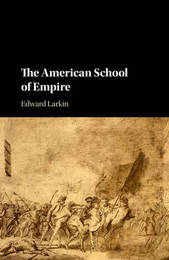
|
The American School of Empire
Hardback
Main Details
| Title |
The American School of Empire
|
| Authors and Contributors |
By (author) Edward Larkin
|
| Physical Properties |
| Format:Hardback | | Pages:182 | | Dimensions(mm): Height 235,Width 158 |
|
| Category/Genre | Painting and paintings
Colonialism and imperialism
Social and political philosophy |
|---|
| ISBN/Barcode |
9781107140202
|
| Classifications | Dewey:325.320973 |
|---|
| Audience | | Professional & Vocational | |
|---|
|
Publishing Details |
| Publisher |
Cambridge University Press
|
| Imprint |
Cambridge University Press
|
| Publication Date |
1 December 2016 |
| Publication Country |
United Kingdom
|
Description
Early American artists and political thinkers wrestled with the challenges of forming a cohesive, if not coherent, culture and political structure to organize the young republic and its diverse peoples. The American School of Empire shows how this American idea of empire emerged through a dialogue with British forms of empire, becoming foundational to how the US organized its government and providing early Americans with the framework for thinking about the relations between states and the disparate peoples and cultures that defined them. Edward Larkin places special emphasis on the forms of the novel and history painting, which were crucial vehicles for the articulation of the American vision of empire in the late eighteenth and early nineteenth centuries.
Author Biography
Edward Larkin is Professor of English and Material Culture Studies at the University of Delaware. He is the author of Thomas Paine and the Literature of Revolution (2010), has edited Paine's Common Sense (2004) and published essays in journals such as American Literary History, Diaspora, Novel: A Forum on Fiction, and Early American Literature.
Reviews'Larkin's study is a unique and important reconsideration of early American political and literary cultures. By re-imagining the constitutive relations between nation and empire, this book makes the cogent case for significantly new understandings of each. It offers original readings of the thematic stakes of early American novels, and puts literary and visual arts into aesthetic and political conversation with one another. This is a major contribution to the study of the early American republic.' Philip Gould, Brown University, Rhode Island 'Through an innovative analysis of loyalist novelists and painters, Edward Larkin persuasively demonstrates that the crucial intellectual challenge facing the United States after independence was not nationhood but empire. Intelligent, judicious, and brimming with insight, The American School of Empire offers an important correction to narratives of American exceptionalism and is a must read to all students of early America.' Max M. Edling, King's College London 'Larkin employs a welcome and light touch when dealing with the ideological contradictions wrapped up in ideas of republican empire and local nationalisms. The quick and easy pace of his writing enables him to cover a lot of ground in ways that will make the book of interest to art historians, literary critics, and historians of British America and the early Republic. After all, who doesn't want to read a smartly written, intelligently argued book that sparkles with insight?' Russ Castronovo, University of Wisconsin, Madison 'This smart and well-argued book advances discussions of Revolutionary-era literature and visual art in important ways. Arguing that the Founders set about creating an empire-with-a-difference, Larkin shows how the theme of empire resonates in a range of texts and paintings from their era. He adapts literary critical techniques of close reading to the paintings, analyzing them for form, technique, and meaning, and the results are highly successful. The American School of Empire will have a substantial impact on the field of American studies.' Sandra Gustafson, University of Notre Dame, Indiana 'The American School of Empire is timely and particularly compelling. Larkin's argument shows the unique character of the American empire as it took shape in the late-eighteenth and early-nineteenth centuries. Moreover, in explaining the relationship between Loyalism, Loyalist sympathizers, and the birth of the American empire, he takes the measure of the debate about American exceptionalism and offers a new basis for understanding that claim. Well researched and well written, this book should be read by all manner of literary scholars and art historians who work on American materials of the late-eighteenth and early-nineteenth centuries.' Leonard Tennenhouse, Duke University, North Carolina '... as a contribution to the history of ideas and the history of empire, The American School of Empire brings renewed attention to the Revolution and the decades after and asks scholars to reconsider this time as not only a period of nation-making, but of empire as well.' Adrianne Francisco, Society for U.S. Intellectual History, Book Reviews (https://s-usih.org/)
|